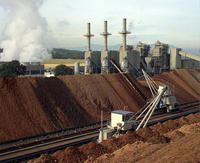-
Oklahoma University gets DHS research grant
The University of Oklahoma Health Sciences Center (OUHSC) was awarded a $490,000 grant from DHS for a 2-year study of how law enforcement officers utilize awareness of their surroundings to collect and then analyze intelligence related to potential terrorist threats
-
-
Facebook, antivirus providers in Internet security campaign
Facebook, Microsoft, McAfee, Symantec, Trend Micro, and Sophos have joined in a campaign to make it easier for Facebook users to stay safer and more secure online
-
-
Waste-to-energy technology deployed in California

A new Anaerobic biodigester waste processor, which relies on bacteria to break down biodegradable waste material in the absence of oxygen, is deployed by a Sacramento, California company; it converts 7.5 tons per day of food waste from regional food producers, including Campbell’s Soup Company, and a half ton each day of unrecyclable corrugated material into natural gas; the system will generate roughly 1,300 kWh of renewable energy per day, meeting about 37 percent of the company’s electricity needs and preventing an estimated 2,900 tons of waste from entering landfills each year
-
-
Safe fracking requires distance from sensitive rock strata
Fracking — the process which releases natural gas and oil from shale rock strata – is becoming more and more popular because it promises access to new, abundant sources of energy; the process of fracking, however, has been associated with increase in the frequency of earthquakes and contamination of drinking water; scientists examine thousands of fracking operations in the United States, Europe, and Africa, and conclude that in order to minimize water contamination and earthquakes, there should be a minimum distance of at least 0.6 km between a fracking operation and sensitive rock strata
-
-
Increased U.S earthquakes may be caused by fracking

From 1970 to 2000 the number of magnitude 3.0 or greater temblors in the U.S. mid-continent averaged twenty-one annually; by 2011 the number of such quakes had increased to 134; a new study by the U.S. Geological Survey links the increase of seismic activity to the increase in the use of hydraulic fracturing, or fracking
-
-
Harris deploys public safety communications system in Virginia
Harris Corporation has received a $10 million contract from Pittsylvania County, Virginia, to deploy a public safety digital communications system based on P25 Phase 2 standards
-
-
Wisconsin county has a new LMR system
In Rock County, Wisconsin, firefighters have been required manually to change radio channels as they moved from North to South because of two different frequencies in the region; Raytheon is helping to combine three disparate communications systems in the country into one; the result will be more efficient – and interoperable – first response communication system
-
-
Scientists: Deepwater Horizon exposed gaps in deepwater oil spill knowledge

On the second anniversary of the Deepwater Horizon oil spill in the Gulf of Mexico, a national team of scientists warns that inadequate knowledge about the effects of deepwater oil well blowouts threatens scientists’ ability to help manage comparable future events
-
-
Honda to reuse rare Earth metals from used parts

Rare Earth elements are essential to advanced technological application and to green technology products; China controls 97 percent of the world’s production of these elements, and has been using its near-monopoly to hobble non-Chinese companies and for political blackmail; in response, two Japanese companies announce a new process allowing them to extract as much as 80 percent or more of rare Earth metals contained in used nickel-metal hydride batteries
-
-
Industrial, materials industry facing risks on global scale
The struggling global economy and recent disasters, including the Thailand floods and Japan earthquake and tsunami, have forced the global industrial and materials industry to change the way it views and prioritizes resources for risk response
-
-
INCOM to commercialize Argonne’s detection technology
Microchannel plate (MCP) detectors are used for detection of particles (electrons or ions) and impinging radiation (ultraviolet radiation and X-rays); this is an important technology for a variety of imaging applications ranging from medicine and physics to national security
-
-
April 2011 was one of the worst ever in terms of killer tornadoes
The month of April 2011 saw a historic outburst of 202 tornadoes which turned broad swaths of southeastern United States into a disaster zone; researchers believe that something called a “thermal boundary” set the stage for the birth of these killer storms
-
-
Scale of 2011 disasters challenged established thinking on nature of risk
New paper says that the scale of the catastrophes experienced in 2011 exceeded previous loss-modeling predictions and has challenged established thinking on the nature of risk; the paper says that, post-2011, companies need to re-examine their risk management strategies and introduce new methodologies to strengthen their operational and financial resilience
-
-
Westinghouse AP1000 reactor concludes qualification testing
Westinghouse AP1000 nuclear reactor’s design differs from earlier reactor design in that it employs passive safety systems which rely only on natural forces such as gravity safely to shutdown and remain cool; Westinghouse says it has successfully completed the design, manufacture, and qualification of the lead AP1000 Reactor Coolant Pump
-
-
Feds recruit companies to aid in cyberdefense
The U.S. national security community is intensifying its efforts to enlist the aid of the private security sector in bolstering the U.S. cyberdefenses
-
More headlines
The long view
Factories First: Winning the Drone War Before It Starts
Wars are won by factories before they are won on the battlefield,Martin C. Feldmann writes, noting that the United States lacks the manufacturing depth for the coming drone age. Rectifying this situation “will take far more than procurement tweaks,” Feldmann writes. “It demands a national-level, wartime-scale industrial mobilization.”
Trump Is Fast-Tracking New Coal Mines — Even When They Don’t Make Economic Sense
In Appalachian Tennessee, mines shut down and couldn’t pay their debts. Now a new one is opening under the guise of an “energy emergency.”
Smaller Nuclear Reactors Spark Renewed Interest in a Once-Shunned Energy Source
In the past two years, half the states have taken action to promote nuclear power, from creating nuclear task forces to integrating nuclear into long-term energy plans.
